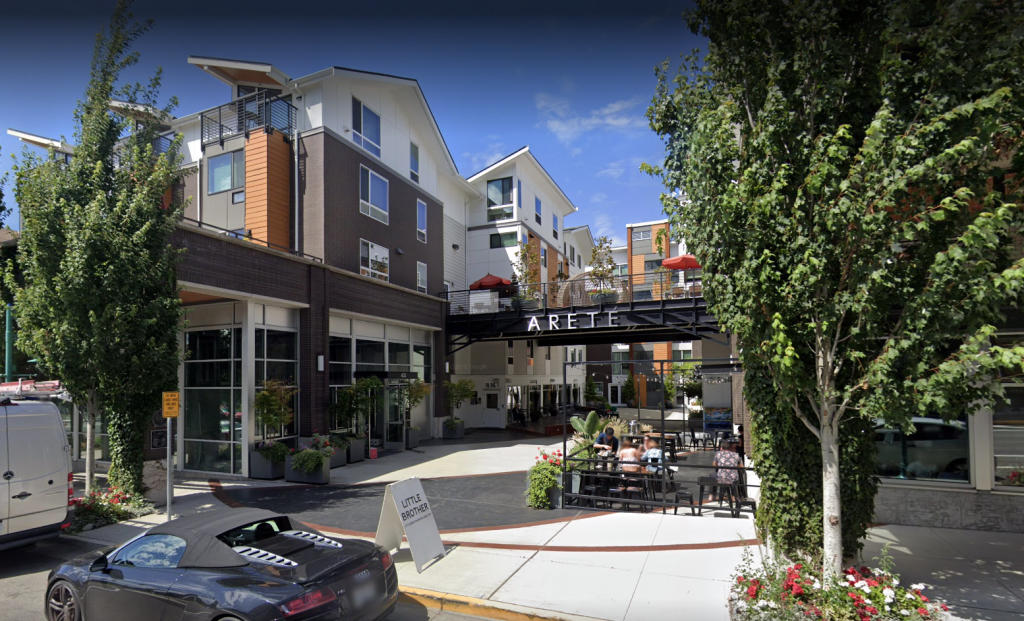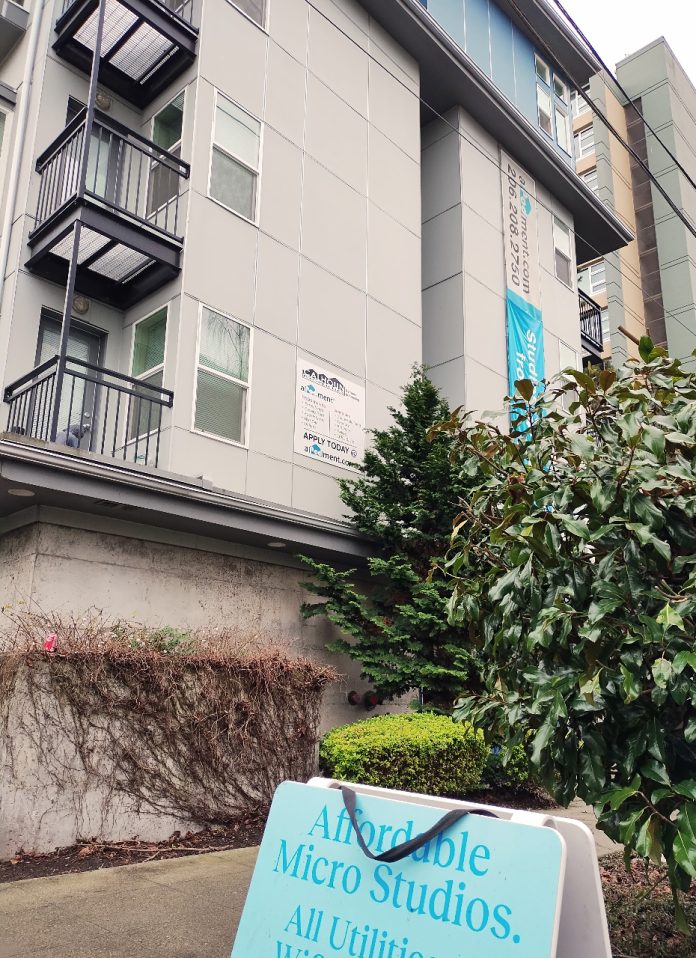The Washington State Legislature is considering legalizing “co-living housing” in cities and towns across Washington, which could open the door to new micro-apartments offered at lower rents and help fill a niche that’s primarily being left to subsidized housing to solve. House Bill 1998, sponsored by Representative Mia Gregerson (D-33, SeaTac) and Andrew Barkis (R-2, Olympia), received its first hearing Monday on the first day of the 2024 legislative session, giving it a head start on most other legislation. Its Senate counterpart, Senate Bill 5901, received a public hearing early Tuesday and looks poised to advance as well.
Co-living housing is a rebrand seeking to avoid the negative connotations associated with “single-room occupancy” (SRO) buildings or boardinghouses. Under such an arrangement, tenants rent private rooms with sleeping quarters, but use shared kitchens, dining areas, and community spaces. These micro-apartments are often available for significantly lower monthly rent than nearby studio and one-bedroom apartments. And the co-living element, where residents interact with each other for regular shared meals and activities in common areas, can provide a type of community interaction for people who might otherwise be generally isolated.
The bill would require cities and counties to allow co-living housing buildings everywhere they allow multifamily housing, including in their mixed-use zones where ground-level storefronts might otherwise be required. It also stops localities from imposing regulations that might make co-living buildings infeasible, including requiring unit sizes larger than state building code standards, requiring a mix of housing types like studios or one-bedrooms, and any other standards that aren’t applied to any other type of use in the multifamily zone.
It would also ban local governments from imposing any requirements for a minimum number of parking stalls within a half-mile of a relatively frequent transit stop, and from requiring more than one parking stall for every four sleeping units outside of those areas.
Single-room occupancy buildings were common in American cities for much of the 20th century until a backlash against them nearly wiped them out. Opponents exploited fears of increased crime and urban disorder along with real safety concerns around fire code compliance, causing many cities to regulate them out of existence. In Seattle, this took the form of the “Ozark Hotel ordinances” following an arson that killed 21 people at that hotel, located on Westlake Avenue. But in an era with much more stringent fire codes, many jurisdictions are looking at allowing micro-apartments back into their cities. In 2023, Oregon legalized SROs in all residential zones across the state, with areas of low-density zoning maintain a six-unit cap.

“We know that the housing spectrum moves all the way from your very, very micro-housing to your mansions,” Rep. Gregerson told the committee while introducing the bill. “And this is just one of those areas where folks who want to live in a home that’s basically between 150 to 300 square feet, most likely [have] their own bathroom, but they have shared facilities. And we know that for some folks, whether it’s students or single adults, aging seniors, this is a really great opportunity for them to stay in their communities close to where they work, go to school, or seek connection with community.”
“The key is we need to build all types of housing,” Rep. Barkis, one of the primary sponsors of House Bill 1110, last year’s successful bid to eliminate single-family zoning in most Washington cities, told the committee. “And this is another way to get at that ladder. This gets to truly unsubsidized affordable housing.”
Also backing the bill is Governor Jay Inslee’s administration, in the form of the state’s Department of Commerce, which oversees housing policy in Washington.
“Commerce is here supporting House Bill 1998 because allowing co-housing makes possible smaller, more affordable units, more flexible living arrangements,” Tedd Kelleher, the department’s housing division policy director, said at the hearing. “Options like co-housing used to be common in the United States because they’re a practical solution to what people need, but then they were subsequently made illegal in many places.”
Opposition to the bill was scant this week, but the Washington Association of Cities did raise a few concerns.
“We haven’t heard very many objections to the primary thrust of the bill, ensuring that these types of co-living smaller efficiency units are authorized where we’re allowing other multifamily,” Carl Schroeder, lobbyist for the Washington Association of Cities, told the committee, raising some minor issues with the bill around capping utility fees. But Schroeder did raise the issue of limiting required parking, once again relying on a data point that in Seattle, four out of five families have at least one car. Schroeder made similar arguments in 2023 to try and limit parking provisions in bills like HB 1110.
That prompted Representative Julia Reed, a Seattle Democrat who last year sponsored a bill that would remove minimum parking requirements near transit, to prod Schroeder on the issue.
“Isn’t it true that after implementing parking minimum reform over 70% of new buildings in Seattle are still providing off-street parking to residents, even though they now just have flexibility on how that is provided?” she asked. Seattle passed parking reform in 2018, but left mandates in force outside of its designated urban villages and centers. Reed noted that more than 1,400 U.S. cities had either scaled back parking mandates near transit or eliminated them altogether, including Austin, Atlanta, Buffalo, and San Diego.

Schroeder’s response was that removing parking mandates should be a choice left to the cities. “Those, as I understand it, are all optional decisions that those cities have made,” he said. But if kept in place, parking minimums could be used to ensure that co-living buildings remain infeasible in practice, with small lots where new co-living buildings would make sense not able to accommodate dozens of off-street parking stalls.
At the bill’s Senate hearing Tuesday, the bill’s parking provisions did get a little additional scrutiny, with Senator Liz Lovelett (D-40, Anacortes) asking about an “off-ramp” that could allow cities to require additional parking if they conduct a study that shows that it’s necessary for the specific site. The idea of taking away the ability of cities to require parking has proven one of the hardest pills for the current legislature to swallow even as it’s advanced significant changes to state zoning laws and seen cities like Spokane take the leap in passing parking reform.
Most of the housing advocates speaking in favor of HB 1998 spoke to the level of flexibility having co-living buildings in communities would provide for community members.
“The definition of aging in place is aging in the communities where they want to be,” Cathy MacCaul, advocacy director for AARP of Washington. “Right now, we do have a housing supply crisis especially for older adults. They’re limited in terms of their options.”
MacCaul described the increasing reality of older people who want to downsize from their single-family home but can’t afford to do so, keeping them isolated. “These co-living models have these shared community spaces, they have shared kitchen spaces they have shared theater or living room spaces. So we’re just really excited about this as a model and something that I think will help older adults age with dignity and purpose,” she said.
HB 1998 could advance out of the House’s housing committee as early as this week, moving it forward with a number of other housing reform measures that are planned over the 60-day short session, which ends March 7.
Ryan Packer has been writing for The Urbanist since 2015, and currently reports full-time as Contributing Editor. Their beats are transportation, land use, public space, traffic safety, and obscure community meetings. Packer has also reported for other regional outlets including Capitol Hill Seattle, BikePortland, Seattle Met, and PubliCola. They live in the Capitol Hill neighborhood of Seattle.



